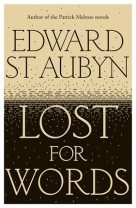Edward St Aubyn’s satire Lost for Words skewers literary prizes and the foibles of those who enter and judge them. It’s a stylish and enjoyable romp that reeled me in. Funny and caustic in equal measure, there’s a touch of pantomime and moustachioed suspense as the announcement of the winner draws nigh. Who will claim the prestigious Elysian Prize?
The judging committee is (surprise, surprise) divided. From hundreds of submissions it must choose the best book of the year. Each work under contention has its drawbacks. Each judge has strong opinions and disagreement is rife. How can they possibly decide?
Tobias wants a work called wot u starin at to win because it’s ‘fascinating, harrowing and fiercely original’. Jo wants a book that’s ‘relevant’ to take the prize. Vanessa thinks relevance is irrelevant: ‘The measure of a work of art is how much art it has in it, not how much “relevance”. Relevant to whom? Relevant to what? Nothing is more ephemeral than a hot topic.’
Vanessa also thinks the chosen book should have ‘depth, beauty, structural integrity, and an ability to revive our tired imaginations with the precision of language’.
Malcolm, the chairman, sees Vanessa failing in her quest like she’s ‘a doomed backbencher, making speeches to an empty chamber about values that simply had no place in the modern world’.
Malcolm wants a Scottish novel to win.
The authors and their literary hangers-on also have their peculiarities.
Sonny believes his book, The Mulberry Elephant, deserves the prize. But, Alan — a failed publisher and spurned lover — desperately wants to rinse away the nasty taste of Sonny’s novel by going into a bookshop, buying a book and being reminded of what quality literature is all about.
Katherine and Sam, whose novels were listed for the Elysian, declare themselves sick of prizes by the time the winner is announced. ‘Comparison, competition, envy and anxiety,’ says Sam in pithy summation of what they’ve experienced.
Katherine is a fine writer and an opportunistic heart breaker, excellent at playing the field. She believes that, ‘In the Dodge City of romantic love, crowded with betrayal, abandonment and rejection, it was better to fire first than to take the risk of being gunned down.’
Katherine also says Didier, who has been one of her many lovers, lives ‘in a perpetual semiotic frenzy’ and claims this is one of the reasons their affair was so brief.
Didier is a French cultural theorist (what else!), whose latest text is titled Qu’est-ce la Banalité? Didier’s extemporising is clichéd, amusing and telling. At one point he highlights how pervasive egomania is in global capitalism. ‘We are prisoners of our own gaze,’ he says.
As you’ll have gleaned from the number of quotes included in this post, Lost for Words is packed with crack-a-jack sentences.
St Aubyn also offers a refreshing blend of the playful, the audacious and the true.
I loved that Penny thinks historical novels are wonderful because you meet so many famous people in them, ‘like reading a very old copy of Hello! magazine’.
I also welcomed the prompt to think more about what role art can play in our self- and celebrity-obsessed culture and what role competitiveness plays (or should play) in art.
Lui Ping Wo, Chairman of Shanghai Global Assets, the new owners of the Elysian Group, takes a firm line on artistic competitiveness claiming there’s no place for it.
‘Personally, I think that competition should be encouraged in war and sport and business, but that it makes no sense in the arts. If an artist is good, nobody else can do what he or she does and therefore all comparisons are incoherent.’
Some critics say Lost for Words is the product of sour grapes spawned as a result of St Aubyn failing to receive the Man Booker in 2006 and failing to be shortlisted for the prize in 2011.
St Aubyn said he never lost any sleep over the Man Booker and that the challenge he set himself with this novel was to see if he could enjoy writing.
He and his readers are ‘winners’ as a result.
Lost for Words won the 2014 Bollinger Everyman Wodehouse prize given to a novel which best ‘captures the comic spirit’.
So, if you want laughter with your good literature, drink this.




Recent Comments